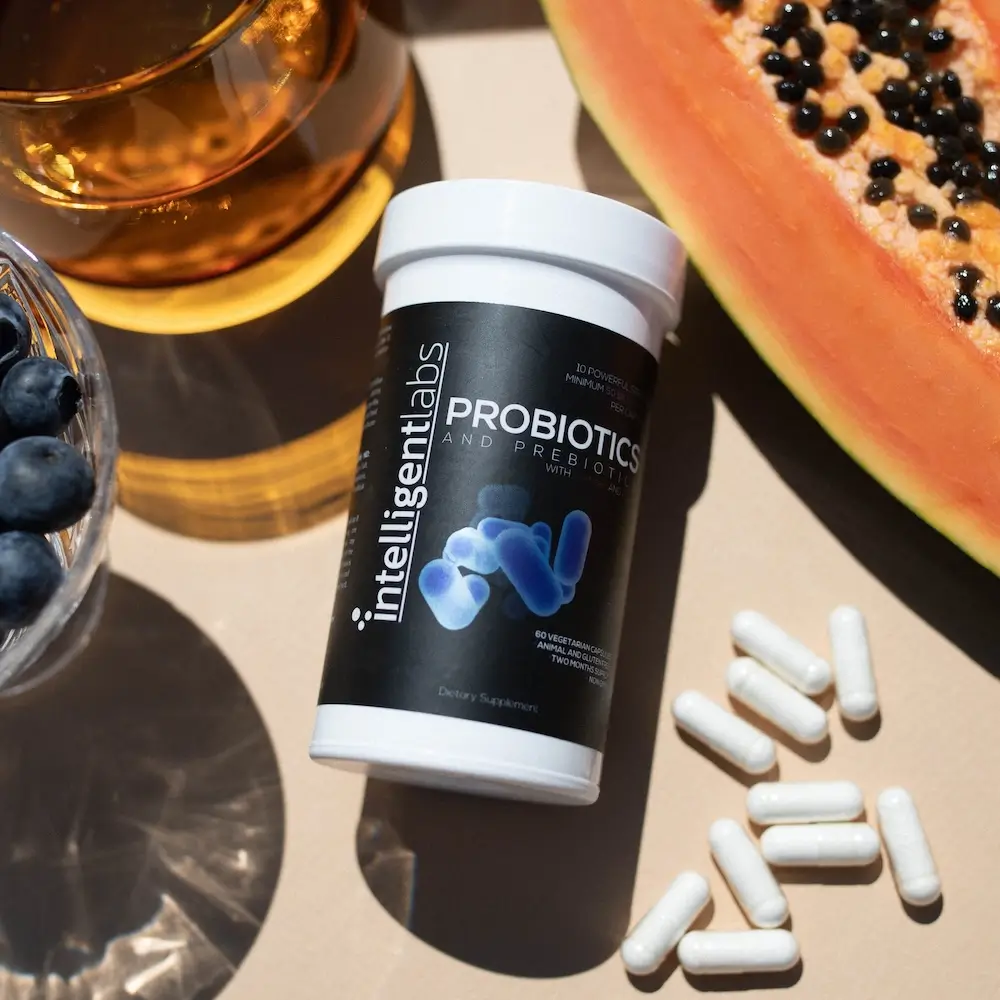Probióticos para Bajar de Peso – ¿Realmente Ayudan?
We’ve all heard that losing weight is about slot88 MVP189 eating less and moving more. But what if your gut bacteria didn’t get the memo? Turns out, your microbiome might have a say in how your body stores fat, feels hunger, and handles calories. In this blog, we’ll explore how gut bacteria affect weight, what the science says about live cultures for weight loss, and which strains may actually help.
Can gut bacteria really make you fat?
We don’t often think about bacteria when it comes to weight loss, but your gut microbiome may play a surprisingly big role. From how you digest food to how hungry you feel, the bacteria in your gut could be influencing your body more than you realize.
An imbalanced gut can promote fat storage
Your gut is home to around 100 trillion bacteria. While many help with digestion, others can influence fat storage, hunger, and insulin sensitivity.1 If your gut is out of balance, it might actually make weight loss harder.
Lean people tend to have more diverse bacteria
Studies show that people with leaner bodies tend to have more diverse gut microbiomes. In fact, slim individuals have up to 70% more bacterial diversity than those who are overweight. People in less industrialized regions, where obesity is less common, also tend to have greater diversity.2
Genetics may shape your gut and your weight
Twin studies reveal that our genes partly determine which bacteria live in our gut. One family, Christensenellaceae, is more common in lean people. When researchers added it to mice, those mice gained less weight – even with the same diet.2
Some microbes may increase hunger
The bacterium Helicobacter pylori helps regulate ghrelin, the hormone that signals hunger. As H. pylori levels have declined due to antibiotics, ghrelin levels stay higher after meals. This may lead to overeating.3
Antibiotics may throw gut balance off
Antibiotics, whether prescribed or in our food, can disturb the balance of gut bacteria. In mice, the combo of a high-fat diet plus antibiotics led to the most dramatic weight gain.4 5 This disruption may be one reason obesity rates have risen alongside antibiotic use.
How can live cultures help with weight loss?
Yes, calorie deficit matters. But gut bacteria might be shaping how your body handles those calories. Certain live cultures can influence weight by improving metabolism, reducing inflammation, supporting insulin sensitivity, and more.

1. Live cultures may reduce belly fat
Some strains help reduce both visceral (deep abdominal) and subcutaneous fat. In one study, adults with higher BMI who consumed a live culture daily for 12 weeks saw a significant reduction in belly fat, body weight, BMI, waist, and hip size. The live culture group lost about 4.6% visceral fat and 3.3% of their subcutaneous fat.6
2. They help regulate appetite and calorie absorption
Certain gut bacteria influence how many calories your body extracts from food. Live cultures that support microbial balance may also help regulate appetite hormones and keep you feeling full longer.7
3. They may improve insulin sensitivity
Live culture supplementation has been shown to support blood sugar control and insulin response. This helps the body burn fat more efficiently and reduces the likelihood of fat storage.8 9
4. They help lower inflammation
Chronic inflammation is a major factor in obesity. Live cultures help reduce systemic inflammation, which supports metabolic health and weight loss.8
5. They may help with weight maintenance
In one 24-week study, women who took live cultures continued to lose weight during the maintenance phase. Meanwhile, women in the placebo group gained weight back. This trend wasn’t seen in men, which may point to gender-specific responses.10
6. They may enhance diet results
In a study on people with coronary artery disease, those who combined live cultures with a weight loss diet saw better improvements in metabolic health than those who only followed the diet.11
What are the best live cultures for weight loss?
Not all live cultures are created equal. Some are great for digestion, others for immune support, and a few have been studied for weight-related benefits. Here are the most promising live cultures for weight management:
| Live Cultures | How It May Help |
| Lactobacillus rhamnosus | Supports fat loss and appetite control, especially in women. May improve leptin sensitivity and promote long-term weight maintenance10 12 |
| Bifidobacterium breve | Clinically shown to reduce body fat, waist and hip size in pre-obese adults. May also improve cholesterol levels (BB-3 studies)13 14 |
| Lactobacillus plantarum | Shown in multiple clinical trials to reduce body weight, BMI, belly fat, and inflammation markers like IL-6 and hs-CRP 15 |
| Lactobacillus acidophilus | May help reduce fat mass, inflammation, and insulin resistance. Supports gut barrier health and improves microbiota balance (animal + multi-strain human studies)16 17 18 |
| Lactobacillus casei | May support fat metabolism and reduce inflammation. Shown to reduce liver fat and fat pad weight in obese mice 19 20 |
| Bifidobacterium lactis | Certain strains, like B420, may reduce weight gain, improve gut barrier function, and support metabolic health in overweight individuals 21 |
| Bifidobacterium longum | Shown to reduce visceral fat, improve body composition, and support a healthy BMI. Some strains may also lower triglycerides and prevent fat gain22 23 |
Looking for a supplement that contains these strains?
Our Adult Live Cultures and Fibre supplement combines 10 patented, acid- and bile-resistant strains (including Lactobacillus rhamnosus, Bifidobacterium breve, L. plantarum, L. acidophilus, B. longum, and more) with prebiotics like Sunfiber® and FOS to help those good bacteria thrive.
Each capsule delivers 50 billion CFUs and is designed for targeted delivery to the gut. It’s free from fillers, allergens, and unnecessary additives. Each bottle provides you with a generous 60-serving supply.
Are live cultures the missing piece in your weight loss journey?
Losing weight isn’t just about eating less or exercising more. Your gut health matters, too. Live cultures aren’t magic pills, but the right strains can support your weight loss efforts by improving digestion, balancing gut bacteria, and helping your metabolism work more efficiently.
💬 Something on your mind? Share your thoughts in the comments. We love hearing from curious minds.
📩 And while you’re here, join our newsletter for more smart stuff (and secret perks)!
References:
- Kim, D., Yoo, S. and Kim, W., 2016. Gut microbiota in autoimmunity: potential for clinical applications. Archives of Pharmacal Research, 39(11), pp.1565-1576. ↩︎
- Yan, F. and Polk, D., 2011. Probiotics and immune health. Current Opinion in Gastroenterology, 27(6), pp.496-501. ↩︎
- Dimidi, E., Christodoulides, S., Fragkos, K., Scott, S. and Whelan, K., 2014. The effect of probiotics on functional constipation in adults: a systematic review and meta-analysis of randomized controlled trials. The American Journal of Clinical Nutrition, 100(4), pp.1075-1084. ↩︎
- Markowiak, P. and Śliżewska, K., 2017. Effects of Probiotics, Prebiotics, and Synbiotics on Human Health. Nutrients, 9(9), p.1021. ↩︎
- Mazloom, K., Siddiqi, I. and Covasa, M., 2019. Probiotics: How Effective Are They in the Fight against Obesity?. Nutrients, 11(2), p.258. ↩︎
- Brusaferro, A., Cozzali, R., Orabona, C., Biscarini, A., Farinelli, E., Cavalli, E., Grohmann, U., Principi, N. and Esposito, S., 2018. Is It Time to Use Probiotics to Prevent or Treat Obesity?. Nutrients, 10(11), p.1613. ↩︎
- Kadooka, Y., Sato, M., Imaizumi, K., Ogawa, A., Ikuyama, K., Akai, Y., Okano, M., Kagoshima, M. and Tsuchida, T., 2010. Regulation of abdominal adiposity by probiotics (Lactobacillus gasseri SBT2055) in adults with obese tendencies in a randomized controlled trial. European Journal of Clinical Nutrition, 64(6), pp.636-643. ↩︎
- Sanchez, M., Darimont, C., Drapeau, V., Emady-Azar, S., Lepage, M., Rezzonico, E., Ngom-Bru, C., Berger, B., Philippe, L., Ammon-Zuffrey, C., Leone, P., Chevrier, G., St-Amand, E., Marette, A., Doré, J. and Tremblay, A., 2013. Effect of Lactobacillus rhamnosus CGMCC1.3724 supplementation on weight loss and maintenance in obese men and women. British Journal of Nutrition, 111(8), pp.1507-1519. ↩︎
- Kobyliak, N., Conte, C., Cammarota, G., Haley, A., Styriak, I., Gaspar, L., Fusek, J., Rodrigo, L. and Kruzliak, P., 2016. Probiotics in prevention and treatment of obesity: a critical view. Nutrition & Metabolism, 13(1). ↩︎
- Wang, Z., Xin, S., Ding, L., Ding, W., Hou, Y., Liu, C. and Zhang, X., 2019. The Potential Role of Probiotics in Controlling Overweight/Obesity and Associated Metabolic Parameters in Adults: A Systematic Review and Meta-Analysis. Evidence-Based Complementary and Alternative Medicine, 2019, pp.1-14. ↩︎
- Borgeraas, H., Johnson, L., Skattebu, J., Hertel, J. and Hjelmesaeth, J., 2017. Effects of probiotics on body weight, body mass index, fat mass and fat percentage in subjects with overweight or obesity: a systematic review and meta-analysis of randomized controlled trials. Obesity Reviews, 19(2), pp.219-232. ↩︎
- Moludi, J., Alizadeh, M., Behrooz, M., Maleki, V., Seyed Mohammadzad, M. and Golmohammadi, A., 2019. Interactive Effect of Probiotics Supplementation and Weight Loss Diet on Metabolic Syndrome Features in Patients With Coronary Artery Diseases: A Double-Blind, Placebo-Controlled, Randomized Clinical Trial. American Journal of Lifestyle Medicine ↩︎
- Luoto, R., Kalliomäki, M., Laitinen, K. and Isolauri, E., 2010. The impact of perinatal probiotic intervention on the development of overweight and obesity: follow-up study from birth to 10 years. International Journal of Obesity, 34(10), pp.1531-1537. ↩︎
- Kim, B., Kwon, J., Kim, M., Park, H., Ji, Y., Holzapfel, W. and Hyun, C., 2018. Protective effects of Bacillus probiotics against high-fat diet-induced metabolic disorders in mice. PLOS ONE, 13(12) ↩︎







